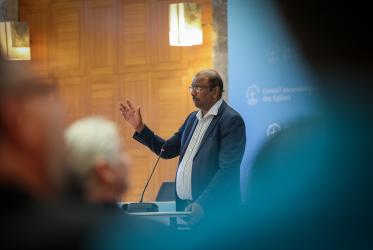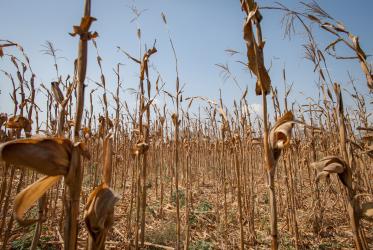Statement from the World Council of Churches (WCC)
to the High-Level Ministerial Segment of the
13th Session of the Conference of the Parties - COP13 to the UNFCCC
3rd Session of the Meeting of the Parties to the Kyoto Protocol - CMP3
Nusa Dua, Bali, Indonesia
Friday, December 14, 2007
Mr. President and fellow participants in this UN Climate Conference:
A Change of Paradigm is needed
It is our conviction as members of faith communities that a Change of Paradigm from one way of thinking to another is needed if we are to adequately respond to the challenge of climate change. It constitutes a transformation, a "metamorphosis". This kind of movement just does not happen on its own; it must be catalyzed by agents of change. The world Faiths could be one of those catalysts.
A change in paradigm appears as mandatory in the prevailing economic strategy of promoting endless growth and production of goods and a seemingly insatiable level of consumption among the high-consuming sectors of our societies. Such economic and consumption patterns are leading to the depletion of critical natural resources and to extremely dangerous implications with climate change and development.
Societies must shift to a new paradigm where the operative principles are ethics, justice, equity, solidarity, human development and environmental conservation.
In our traditions, we believe that the earth was entrusted to us but we simply cannot do whatever we want with it. We cannot make use of nature using it only as a commodity. We must bear in mind that our liberty does not allow us to destroy that which sustains life on our planet.
We Must Act Here and Now
Much has been said and written about addressing climate change. However, a tangible result is not yet on the horizon. The First Commitment Period within the Kyoto Protocol ends in 2012. Time is running out to reach equitable and sustainable targets for post-2012.
Are we ready as human beings, as members of the global society, as members of our faith communities and our organisations, as sovereign nations, to meet what is expected from us? Or are we going to implement new delays, new strategies to avoid our ethical and moral duties? In doing so it would be no less than suicidal, jeopardizing the diversity of life in the earth we inhabit, enjoy and share.
It is time to adopt legal mechanisms that adequately respond to the gravity of the situation as documented by the IPCC and which have enforcement provisions with sufficient strength to compel full compliance.
The Statement adopted by the World Council of Churches Executive Committee on occasion of the "10th anniversary of the Kyoto Protocol", among other issues, clearly reminds us of our responsibilities and points us toward the future:
- The Kyoto Protocol sets out targets and a schedule for industrialized countries to reduce their greenhouse gas emissions. It is an important first step towards a just and sustainable global climate policy regime. However, in the last ten years, it has become clear that carbon emissions are still far above sustainable levels and still increasing. Much more radical reductions are urgently needed.
- The Kyoto Protocol came into force only in 2005. 175 countries have now ratified it
There is also a trend to convert the protocol into a market-based instrument for minimizing economic damage to national economies and business opportunities instead of stressing its purpose of limiting greenhouse gas emissions.
- After 2012, when the first commitments of the protocol end, a more principle-based approach is essential for achieving an effective and equitable global policy on climate control. Principles that should be taken into account include the principle of equal entitlements to the use of the atmosphere and equal rights to development; the principle of historic responsibility the precautionary principle (prospective responsibility); the principle of priority for the poorest and weakest; and the principle of maximum risk reduction.
-
the need for a broader and more radical timetable of action against climate change will be high on the agenda. The Bali conference must make concrete progress in this regard.
- The need now is for more comprehensive policies to support and promote adaptation and mitigation programmes in countries severely affected by climate change, particularly in the Africa, Caribbean and Pacific regions.
We have arrived to the point where we know what is causing climate change. We have expressed all our concerns, cleared our doubts and affirmed what took us to the inequitable situation where the poorer carry the burden of the irresponsible waste of resources, energy and extreme consumerism of the richer. It is time now to start taking the positive actions that will lead us to find practical solutions to the problems of the great majority of today's world population.
The eyes of the world are on us. Hundreds of millions of people, women and men, young and aged, have placed their hopes on us. We have to realize that we are kept in their prayers, every one of them following their own religious tradition. And this we cannot forget. Our mission is not to deceive or disappoint them.
Our willing participation in these great changes is required today, now, and not tomorrow. There is no time left for endless words. There must be no more delays. Once more we cry out:




